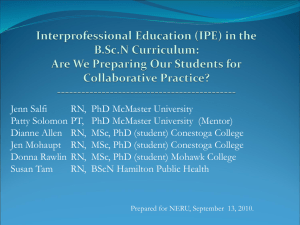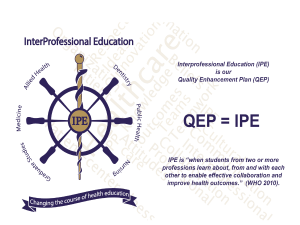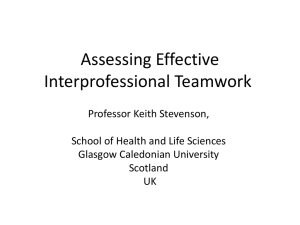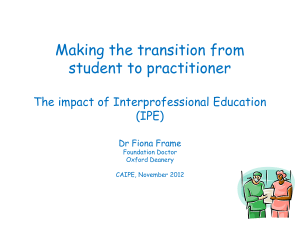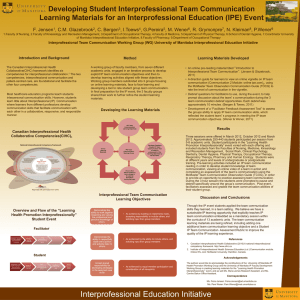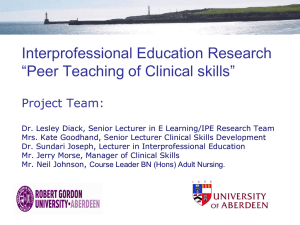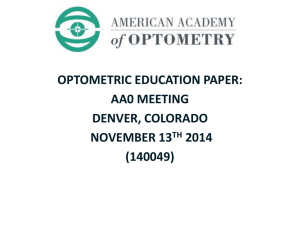Are We Preparing Our Students for Collaborative Practice?
advertisement
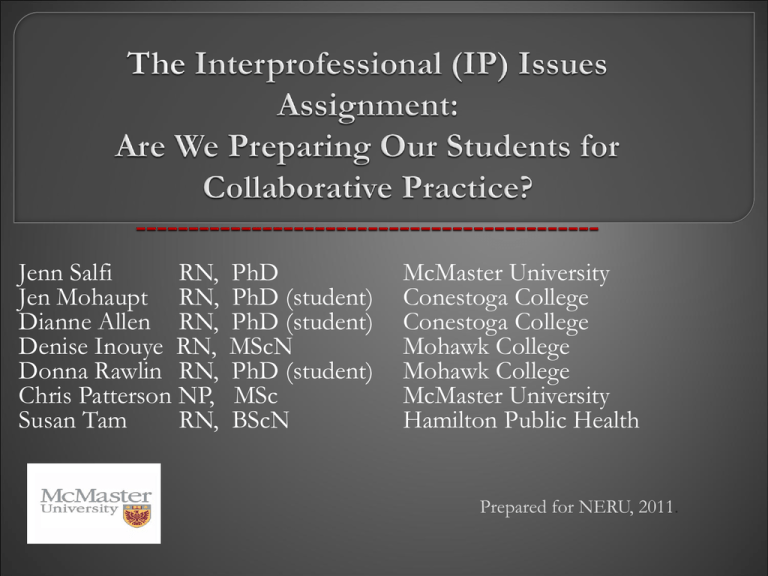
Jenn Salfi RN, Jen Mohaupt RN, Dianne Allen RN, Denise Inouye RN, Donna Rawlin RN, Chris Patterson NP, Susan Tam RN, PhD PhD (student) PhD (student) MScN PhD (student) MSc BScN McMaster University Conestoga College Conestoga College Mohawk College Mohawk College McMaster University Hamilton Public Health Prepared for NERU, 2011. “occurs when two or more professions learn with, from and about each other in order to improve collaboration and the quality of care” (CAIPE, 2002) WHO (2010): IPE is an essential step in preparing a “collaborative practice-ready” workforce CIHC (2010): IPE...key to building effective health care teams; improving the experience and outcomes of patients HFO (2010): IPE...build the foundation upon which key interprofessional care activities can be implemented & sustained Current Status of IPE (Canada): Elective IPE courses & projects Compulsory IPE course Rural Palliative Care Program Compulsory IP Learning Modules Compulsory & Elective Courses Elective & Compulsory IP activities (UBC) (U of A) (U of O) (Dalhousie) (Memorial) (McMaster) (Ho et al., 2008). Why is it so difficult? -Complex; time consuming -Incompatible clinical; timetables; curriculum schedules -Lack of faculty interest & expertise in IPE *Disproportionate # of students across programs *Students distributed across sites *Controversy of IPE at the undergraduate level *Combining separate IPE frameworks Level 1 Strategy: Intra- professional Education & the Foundation of Group Skills Level 2 Strategy: Introduction to IPC/IPE & Exposure to the Health Care Team Level 3 Strategy: Interprofessional Collaboration Level 4 Strategy: Becoming an Effective Member of the Health Care Team Integration of IP Competencies in Pre-Licensure (B.Sc.N) Curriculum (Adapted from HFO, 2010)) SKILLS & BEHAVIOURS: Level 4: Becoming an Effective Member of the Health Care Team IP Competency: Contributes to the overall effectiveness of a health care team). Level 3: Interprofessional Collaboration (IP Competency: Collaborates with other health science students or health care professionals). KNOWLEDGE: Level 2: Introduction to Interprofessional Education (IPE) & Collaboration (IPC); Exposure to the Health Care Team (IP Competency: Knows scope of practice of other health care professionals, & knows when & how to involve other professionals in patient care). Level 1: Intraprofessional Education; Foundation of Group Skills (IP Competency: Knows and can articulate own professional role & responsibilities; knows about group roles and functions). Miller’s Levels of Competence (1990) Entry to Pre-Licensure Program Competencies across four year (four levels) B.Sc.N. program - - Introduces students to IPC; team-based literature Introduces students to IP issues Opportunity to achieve ¾ of the required IPE competencies (McMaster) Opportunity to collaborate with others (professionals/students) Reference to the CNO (2009) Entry to Practice Competencies Mandatory Readings: 1. CIHC (2010) 2. Suter et al (2009) Engage in IPC 1. Must involve > 2 professions (student; professional) 2. Must be interactive (immersion level) Scholarly Paper 1. IP Issue 2. Background Information; Impact of Issue 3. Professional Development r/t issue 4. Strategies (skills, knowledge & behaviours) To assess what students are learning about interprofessional collaboration (IPC), after completing the Interprofessional Issues Assignment. Are we preparing our students for effective interprofessional collaborative practice? Embedded mixed method study design Quantitative component: Will monitor general changes in attitudes and perceptions re: IPC Qualitative component: Will add “meaning” & elaborate on what the students are learning from the assignment Quantitative: Does the Interprofessional Issues Assignment have an effect on Level 4 students’ perceptions and attitudes regarding interprofessional collaboration? Qualitative: How do Level 4 B.Sc.N students experience the Interprofessional Issues Assignment? Overall Question for Mixed Methods study: What is the impact of the IP Issues Assignment, in developing attitudes and knowledge required for interprofessional collaborative practice among Level 4 B.Sc.N students? -4 demographic questions ( age, gender, stream, site) -Questionnaire: before/after completion of IP Issues Assignment (Weeks 2, 10) -Questionnaire: Interdisciplinary Education Perception Scale (IEPS) (McFadyen et al., 2007) -Administered within PBL groups; by “student leaders” Sample: n=268 (pre/post matches) - 77% -Avg. age = 24 yrs (20-57) -Gender = 92% Female; 8% Male -Streams = 77% Basic = 14% Practitioner (Post RN; RPN) = 9% Accelerated -Distribution: Conestoga site (23%) Mohawk site (38%) McMaster site (39%) Statistical Package for Social Sciences (SPSS) Paired sample t-tests: Changes in IEPS scores before/after assignment? ANOVA: Differences between age, gender, stream & site? - Females showed significant increases (p=0.00) - Males did not show any significant difference (? due to small sample (<25)) - Significant increases basic stream (p=0.00) No significant differences noted in the other streams (? due to smaller sample sizes) Key findings: - Conestoga site: disagreed MORE after completing the assignment (p=0.00) (esp. in C & A) - Mohawk site: difference only in C & A (p=0.05) - McMaster site students – no difference before/after Surprise finding: 1) Differences in baseline scores (pre-assignment) Perceived level of Competency & Autonomy: Conestoga & McMaster – difference of 5.4 points Perceived Need for IPC/Cooperation: No difference b/w site scores (pre or post) Perception of Actual Cooperation: Conestoga & McMaster – difference of 3 points Perception of Competency & Autonomy (of Nurses) Difference : Pre-Assignment (5.4 point difference) Post Assignment (2 points) 12 Perception of Actual Cooperation (occurring in the clinical setting) 10 8 Conestoga Difference : Pre-Assignment (3 point difference) Post Assignment (no difference) 6 Mohawk McMaster 4 2 0 Pre-Assignment Scores Post Assignment Scores - 3 focus groups (total of 14 students) - Semi-structured interviews (3 questions; audio-taped; notes) - 2 investigators per focus groups (one recording notes; one asking the questions) - PI not involved in focus groups Convenience; Criterion sampling procedures: students from each site - students representing the basic stream (7) - students representing the practitioner streams (5) - students representing the accelerated stream (2) - same inclusion/exclusion criteria as quantitative phase - Distribution: Conestoga site (n=6) Mohawk site (n=2) McMaster site (n=6) To strengthen the data: Data Source Triangulation: participants from different sites; streams; audiotapes, notes; scholarly papers Investigator Triangulation: 6 co-investigators collecting notes; analyzing data Method Triangulation: findings from the qualitative data will be compared to quantitiative (to see if statistical trends are supported by qualitative themes)(Creswell, 2008). Data entered, and partially processed and validated using NVIVO software (research staff) Once analysis is completed, investigator triangulation (research team) NERU 2011: Quick content analysis (investigator notes; scholarly papers) and partial analysis generated from NVIVO Coding Scheme: A) Feedback re: IP Issues Assignment (Readings; IP Experience; Scholarly Paper) B) Learning/Lack of Learning C) IPE “Wish List” D) Preparation for Collaborative Practice? Readings: - Suter article (13); CIHC (4) - Compliance: 11/14 IP Experience: - Clinical experiences (7) - IPE student experiences (5 ) - Compliance: 11/14 “ ... I wouldn’t have even realized that was an issue during my interprofessional experience if it wasn’t for the previous readings that were mandatory. So that was really helpful.” Scholarly Paper: (5 or more comments) - Don’t make IP experience mandatory Recommend 2 papers (IPC; IP Issues) All criteria of paper effective Appreciation for “real” assignment Timing of due date More structure in grading scheme Keep the assignment in the program (unanimous)! - “Common sense” is not so common “.... this assignment made me aware that it (interprofessional collaboration) doesn’t always work out ...and prepared me for that possibility.” “ it (interprofessional collaboration) is more than just different professions coming together” “ this assignment showed me that research and actual practice don’t always mesh” Increased awareness of - RN role; other professional roles - IP conflict (MD/RN relationship) - effects on patient care; patient safety - competencies/ strategies required for IPC - current deficiencies in BScN program (silo; lack of IPE) “nurses like to lie low” “avoid conflict” “they do not have the tools to address conflict” “they are not assertive enough with others (professionals)” -All three sites – IP PBL classes -Need more/want more IPE events/experiences -Get credit for attending IPE events/experiences -Make attendance at IPE events mandatory (every term; level) -Easier access (r/t registration for events) “it would be helpful to have students from other disciplines in our PBL groups but not until after second year. That way nurses (student nurses) would get a good understanding of their own roles before learning about the roles of others. “ - Role clarity - Effective Communication - Conflict management - Collaboration - Shared Decision-making “The beginning of wisdom is the definition of terms” - Socrates “Now I do not feel alone…” “We’re all in this together” “Motivates me to collaborate” “Keeps it (IPC) on my mind when I’m at (clinical) placement and work” - Timing of post questionnaire (after 3.5 hr class) - Recruitment for qualitative phase (students from Basic stream at Mohawk; only 1 Post RN) - Inability to standardize the training of the Level 4 tutors (in IPE) Quantitative Data: 1) Post test scores higher than pre test scores (more disagreement with statements in the IEPS) 2) Baseline Perceptions (pre test scores) (diff. of 5.4 points - Conestoga & McMaster) Qualitative Data: 1) Feedback: Positive 2) Learning Occurred 3) Students want more! Are my quantitative findings so different from most IPE initiatives? Majority of IPE initiatives Voluntary Not evaluated Pre/post test done same day Primarily students involved Fun Safe IP Issues Assignment Mandatory Evaluated 10 weeks b/w pre & post tests IP experiences in clinical placements (professionals; reality-based) Nature of the assignment – “Issues” “The more I learn, the more I realize I don’t know” -Albert Einstein Reality Check: “Common sense is not so common” -Voltaire Profession of Nursing: CNO National Competencies & Clinical Observation -IPE throughout curriculum (mandatory) -Extra curricular IPE (credit) -Level 4 IPE focus – clinical setting (real) - Continue to create & evaluate IPE initiatives – Are we preparing our students for interprofessional collaboration? - Research across BScN Programs - Mixed Methods
